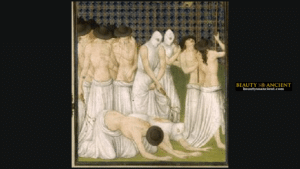St John Chrysostom’s Sermon for the New Year
St John Chrysostom’s Sermon for the New Year, is an example of a sermon that cuts right to the heart, as all his sermons do.
On this New Year’s Day and Feast of the Circumcision, we thought we’d share this sermon for the new year with you.
Enjoy!
Sermon for the New Year
1. Just as a chorus seeks the chorus leader, and a crew of sailors the helmsman, so also the assembly of these priests today seeks the high-priest and common-father. But in the case of the chorus and the ship frequently the absence of those in charge wrenches them away from good-order and stability; but it is not so in this case. For even if he[1] is not present in the flesh, he is present rather in the spirit, and now is with us, though sitting at home, just as we also are with him there, though standing here. For such is the power of love, it is accustomed to bring together and bind those who are divided by a great distance.
At any rate if we love someone who is spending time in a foreign place and separated from us by vast seas, we imagine them each day, so then when we are ill-disposed to someone, neither do we think it good to often see him near at hand. Thus when there is love, there is no harm from the division of place, but when love is absent, there is no gain from the nearness of place.
Lately, when we were praising the blessed Paul, you so were prancing about, as if seeing him present; though his body lies in regal Rome, but his soul in the hands of God: For the souls of the just are in the hand of God, and torment will never touch them.[2] Nonetheless the power of love placed him before your eyes. And I was planning to enter into the same subject again today, but the message moves us to other things pressing upon us, the sins committed today by the entire city. For they ought first to have been emulators of Paul’s virtue, and worthy of such a lecture, those who are listening to the praises of Paul. Since then the father[3] is not present to us, come – let us cleave to his teaching, relying on his prayers. For even Moses, not being present in the body with the combatants, contributed to that battle, not less than those fighting, but more by far even, urging on the actions of his men by the outstretching of his hands, and making them dreadful to their opponents.[4] For just as the power of love is not separated by a division of place, so neither is the efficacy of prayer, but just as the former binds those removed from one another, so also the latter is able to greatly benefit those far off.
Having confidence therefore let us proceed. For the war is begun for us, not with the coming of the Amelikites, as then, nor with some other overrunning Barbarians, but with demons leading a procession in the forum. For the diabolical night-festivities that occur today, the jests, the abuse, and the nocturnal dances, and this comedy, absurd and worse than every enemy, took our city captive; and it is necessary to be restrained[5] in these matters, to mourn, to be overcome with shame, both those having sinned and those not having sinned, those for whom they sinned, and those for whom they saw [their] brothers doing shameful things[6]; and our city has become exceedingly glad and joyful, and crowned, as a woman fond of adornment and extravagant, so the forum lavishly decked itself out today, putting on gold, and extravagant clothing, and sandals, and other such things, as of those in workplaces, each by the display of his own works surpassing his fellow worker in rivalry.[7] But this is ambition, even if childish of thought, and imagining nothing great or lofty in mind, but nevertheless it does not attract such harm, but is a certain thoughtless eagerness, pouring down laughter on those eager for such things. For if one wishes to adorn oneself: [let it be] not the workshop, but his own soul; not the forum, but the intellect; so that the angels marvel, and the archangels approve the thing, and the Master of the Angels repay you with gifts from himself; as the example itself, now the event, brings both laughter and jealousy, laughter from the understanding of the loftier, jealousy and much envy from those suffering the same things.
2. But, as I said, ambition itself is not worthy of such accusations; those who happen today to game in the taverns, these cause especial pain, and are full of much profligacy and impiety; [full] of impiety, because those doing these things observe days[8], consult auguries, and think that if one celebrates the new moon of this month with pleasure and happiness, then the whole length of the year will hold the same; of profligacy, because men and women having filled bowls and cups drink unmixed wine until dawn. These things are unworthy of our philosophy[9], whether you do them, or you permit others to do them, whether servants, or friends, or neighbours. Have you not heard Paul saying, “You keep days and months and seasons and years; I fear lest I have laboured in vain for you”?[10] Otherwise it is of the most extreme folly that from one day, if it be fortunate[11], to expect this from the whole year; but it is not of folly alone, rather this is the judgment of diabolical activity, not to entrust the things of our life to our own haste and eagerness, but to cycles of the days. The whole year will be fortunate for you, not if you are drunk on the new-moon, but if both on the new-moon, and each day, you do those things approved by God. For days come wicked and good, not from their own nature; for a day differs nothing from another day, but from our zeal and sluggishness. If you perform righteousness, then the day becomes good to you; if you perform sin, then it will be evil and full of retribution. If you contemplate these things, and are so disposed, you will consider the whole year favourable, performing prayers and charity every day; but if you are careless of virtue for yourself, and you entrust the contentment of your soul to beginnings of months and numbers of days, you will be desolate of everything good unto yourself.

Which then the Devil perceiving, and hastening to make an end of our labours in virtue, and to extinguish our willingness of mind, taught success and failures to be inscribed on the days. For the one persuading himself that a day is evil and good, will neither have a care for good deeds on the evil day, as if performing all things in vain, and benefiting nothing on account of the necessity of the day; nor again on the good day will he do this, as if from his own idleness causing no harm, again on account of the good fortune of the day; and thus from each he promotes his own wellbeing[12]; and sometimes doing profitless things, sometimes superfluous things, he will pass his life in leisure and wickedness. Knowing which, he must flee from the wiles of the devil, and cast out this influence of thought, and observe not the days, neither to hate one nor to love one. For that wicked demon does contrive these things, not only in order to cast us into idleness, but also to revile the works of God, wishing to draw down our souls both into impiety and idleness at the same time.
But we are obliged to resist, and to know clearly, that nothing is evil but sin alone, and nothing good but virtue alone, and to please God always. Strong drink does not produce delight, but spiritual prayer; not wine, but a learned word; Wine effects a storm, but the Word effects calm; the former transports in an uproar, the latter expels disturbance; the former darkens the understanding, the latter lightens the darkened; the former imports despondencies that are non-existent, the latter drives away those there were[13]. For nothing is so accustomed to produce contentment and delight, as the teachings of [our] philosophy, [which is] to despise present affairs, to yearn for the things to come, to consider nothing of human affairs to be secure, and if you behold some rich man not to be bitten with envy, and if you fall into poverty not to be downcast by that poverty. Thus you are always able to celebrate festivals. For the Christian ought to hold feasts not for months, nor new moons, nor Lord’s days, but continually through life to conduct a feast befitting him. What is the feast that befits him? Let us listen to Paul speaking, “Therefore let us celebrate the feast, not in the old leaven, nor by leaven of evil and wickedness, but with the unleavened bread of sincerity and truth.”[14] If then you have a clean conscience, you hold a feast continually, nourished with good hopes, and revelling in the delight of the good things to come; then just as if you conducted yourself lacking boldness, and you were liable from many sins, and if there be ten thousand feasts and holy-days, you would be in no better state than those grieving. For what is the benefit to me of bright days, if my soul is darkened in its conscience? If then one wishes to gain some benefit from the new moon, do this. When you see the year ending, thank the Lord, because he had led you into this cycle of years. Stab the heart[15], reckon up the time of your life, say to oneself: “The days run and pass by, the years fill-up, we have progressed much of the way; What good is there for us to do? Will we not depart from here, empty and deserted of all righteousness, the judgment at the doors, the rest of life leads us to our old age.”
Love St John Chrysostom’s Sermon for the New Year, You’ll Love These Books!
- On Repentance & Defeating Despair: Letters to Theodore (Early Church Today)
- On Living Simply: The Golden Voice of John Chrysostom
- On Marriage and Family Life
- On the Providence of God
- St. John Chrysostom: Six Books on the Priesthood (St. Vladimir’s Seminary Press Popular Patristics Series)
- On Wealth & Poverty
3. These things, from the new moon, contemplate, these from the circuit of the years, recollect: let us reckon the future day, no longer something spoken to us that, which was said to the Jews by the prophet, “Their days slipped away in vanity, and their years with haste”[16] This is the feast which I mentioned, the continual one, and the one not delayed by the passage of years, not limited by days, both the rich and the poor will be able to celebrate in the same manner: For here there is no want of wealth, nor provision, but only of virtue. Do you not have wealth? But you have the fear of God, a treasure more fruitful than all wealth, not consumed, not changed, not spent-up. Look to heaven, and to the heaven of heavens, the earth, the sea, the air, the kinds of the animals, the manifold plants, the whole nature of human-beings; consider the angels, archangels, the powers above; recall that these are all creations of your Master. It is thus not poverty to be the slave of the providential Master, if you have him as your propitious Lord. The observation of days is not of Christian philosophy, but of Hellenic error. Into the city above you are enrolled[17], into the polity[18] there you are reckoned, you will mingle with the angels; where light does not give way to darkness, nor day fulfilled to night, but is always day, always light. To these therefore let us look continually. “For seek”, he says, “the things above, where Christ is seated at God’s right hand.”[19] You have nothing in common with the earth, where the courses of the sun are, and circuits, and days; but if you live rightly, the night will be day for you; just as then for those living in licentiousness and drunkenness and intemperance, their day is turned into the darkness of night, not with the sun’s extinction, but the darkening of their mind by inebriation. To be passionately excited towards these days, and to receive greater pleasure in them, and to kindle lights in the forum, and to weave wreaths, is of childish folly. But you have been freed from this weakness, and come into adulthood, and been enrolled in the polity of the heavens. Do not therefore kindle sensate fire in the forum, but kindle spiritual light in your mind. “For let”, he said, “your light shine before men, so they may see your good works, and they will glorify our Father in the heavens.”[20] This light brings you much recompense. Do not crown the door of the house, but display such a way of life[21], so that you will receive the crown of righteousness on your head from the hand of Christ. Let nothing be done rashly, nor simply; thus Paul enjoins that all things be done for the glory of God. “For whether you eat,” he said, “or drink, or do whatever, do all for the glory of God”[22] And what is it, he says, to eat and drink for God’s glory? Call the poor man, make Christ a participant of the table, and you eat and drink for God’s glory. But not this alone does he enjoin us to do for God’s glory, but all the rest as well, as to go into the forum, and to remain at home; let these both be done for God’s sake[23]. And how are these both to be done for God’s sake? Whenever you come into church, whenever you partake of prayer, whenever of spiritual teaching, the advance has occurred for God’s glory. Again, it is to remain at home for God’s sake. And how this?[24] Whenever you hear disturbances, disorderly and diabolical processions, the forum filled with wicked and undisciplined men, remain at home, free from this disorder, and you remain for God’s glory. Just as spending time at home and going-out is able to be done for God’s sake, thus also of praise and censure. And what is it to praise something for God’s glory, he says, and to accuse? You sit frequently in workplaces, you see evil and wicked men passing by, raising the eyebrows[25], puffed up, trailing many parasites and flatterers, wearing expensive clothes, surrounded with some mystique, seizing all things, avaricious. If you hear someone saying, “Is he not enviable, is he not blessed?” Rebuke, accuse, silence, pity, weep; this is what it means to censure for God’s sake.
Censure is teaching of philosophy to those meeting together and is so strong of virtue[26], so as to no longer long[27] for the things of everyday life. Say to the one saying these things: Why is this man blessed? Because he has a marvellous horse and a golden bridle, and possesses many servants, and wears bright clothing, and bursts[28] each day in drunkenness and luxury? But for this reason he would be wretched and cursed, and worthy of a thousand tears. I see then that you are able to praise nothing of him, but all things external to him, the horse, the bridle, the clothing, of which nothing is his. What then, tell me, is more pitiable than this, when his horse, and the horse’s bridle, and the beauty of his clothes, and the bodily vigour of his servants are marvelled, but he passes by unpraised? Who then could be poorer than this man, having nothing good of his own, nor anything which he is able to carry away from here, but is adorned entirely by external things? For adornment and riches are properly our own, not servants and clothing and horses, but virtue of soul, and wealth of good deeds, and confidence towards God.
4. Again, you see another man, a pauper, rejected, despised and passing his life in poverty and virtue, considered unhappy by his companions: commend this man, and the praise of this man as he passes by is exhortation and counsel of a useful and good way of life[29]. If they say, “He is wretched and miserable,” say that this one is the most blessed of all, having God as his friend, passing life in virtue, possessing a wealth never failing, having a pure conscience. For what harm is there to him from the lack of possessions, when he is going to inherit heaven and the good things in heaven? And if you yourself philosophise in this manner, and instruct others, you will receive a great reward from both censure and from praises, doing both for God’s glory. And that I do not allure you vainly saying these things, but that a certain great recompense exists with the God of all things for those whose intellect is thus disposed, and that the thing has been considered a certain virtue, [that is] the resolving to do such things, hear what the prophet says concerning those so living, and how he places things in an order of perfections, the despising of those doing wickedness, and the glorifying of those fearing God. For after recounting the other virtue of the one who will be honoured by God, also he says, of what sort one must be to dwell in the holy tabernacle, that is blameless, and performing righteousness, and wicked-less, and this he adds: For saying, “Who did not deceive with his tongue, and did no harm to his neighbour”[30] he adds, “The one doing evil is set at nought before him, but those fearing the Lord he glorifies”[31] showing that this is one of those perfections, that is to despise the wicked, and to praise and bless the good. And again elsewhere this same thing he makes plain, saying, “Your friends were exceedingly honourable to me, God, their beginnings[32] became very strong.”[33] Whom God praises, do not censure: he praises the one living in righteousness, even if he be poor; whom God turns away, do not praise: he turns away the one living in wickedness, even if he be surrounded by much wealth. But if you praise, and if you censure, do both as God wishes. For there is even accusing unto the glory of God. How? Frequently we are vexed with our servants. How then is there accusing for God’s sake? If you see someone drunk, or stealing, whether servant, or friend, or some other of those related to you, whether running into the theatre, or having no concern for their soul, or swearing[34], or perjuring[35], or lying: be angry[36], punish, turn them back, correct; and you did all these things for God’s sake. And if you see someone sinning against you, and omitting something of their service toward you, pardon them, and you are forgiven for God’s sake. But now many do the opposite, both to their friends, and to their servants. For when they sin against them, they become bitter and unforgiving judges; but when they insult God, and ruin their own souls, they produce no rationale. Again, is it necessary to make friends? Make them, for God’s sake. Is it necessary to make enemies? Make them, for God’s sake. And by what means does one make friends and enemies for God’s sake? If we do not attract those friends, whence money is taken, whence sharing of a table, whence obtaining of human patronage, but pursue and make those friends, those able always to order our soul, counsel necessities, rebuke sinners, expose trespassers, restore those fallen, and aiding by counsel and prayers to lead to God. Again, it is permitted to make enemies for God’s sake. If you see someone undisciplined, abominable, full of wickedness, replete with unclean teachings, tripping you up and harming you, stand apart and turn away, just as also Christ commanded, saying, “If your right eye trips you up, pluck it out and cast it from you”[37] commanding those friends, those being desirable in the rank of eyes[38], and necessary in the things of everyday life, to cut off, and to cast out, if they harm you with regard to the salvation of the soul. If you share in their meetings, and you prolong your speech, do even this for God’s sake, and if you keep silent, keep silent for God’s sake.
And what is it to participate in the meeting for God’s sake? If you are seated with someone, converse nothing concerning daily affairs, nor of simple things even vainly and nothing of those related to you, but concerning our philosophy, concerning Hell, concerning the Kingdom of the Heavens, but not superfluities and unprofitable things, such as, “Who entered authority?[39] Who lost power? For what reason was so-and-so injured[40]? Whence did so-and-so profit and become better off? What did so-and-so dying leave behind to such-and-such? How did so-and-so miss out, expecting to be listed among the foremost of the heirs?” And many other such things. Let us not then discuss such things, nor bear others discussing [them]; but let us consider what-doing or what-saying is to please God. Again, it is to keep silent for God’s sake, being maltreated, abused, suffering a thousand evils, https://beautysoancient.com/prayer-every-evil-exorcist-father-gabriele-amorth/if you bear them nobly, and emit no blasphemous word against the one doing these things to you. Not to praise and to censure alone, nor to remain indoors and to go out, not to utter and to keep silent, but also to weep and mourn, and to enjoy and delight is to God’s glory.
For when you see either a brother sinning, or yourself falling into a transgression, [if] then you groan and mourn[41], then you gain from the grief a salvation without regret, just as Paul says, “For grief according to God produces a salvation without regret”[42] If you see another person being highly esteemed, then do not disparage him, but as for one’s own goods give thanks to God, to the one making your brother illustrious, and you receive a great reward from this joy.
5. What then, tell me, is more pitiable than the envious, when it is permitted both to rejoice and to profit through joy, and they prefer rather to grieve upon the advantages of others, and with the grief to yet also attract a punishment from God, an unendurable retribution. And what need is there to speak of praise, and of blame, and of pain, and of joy, when indeed even from the least of these things and from the meanest[43] events the greatest things are to be profited, if we do them for God’s sake?
For what is more lowly than to be shorn? But even this is to be done for God’s sake. For when you do not arrange your hair, nor adorn you appearance, nor decorate yourself for an enticement and beguilement of onlookers, but simply and as it happens and as much as necessity alone demands, you do this for God’s sake, you will in all ways have your reward, because you have checked evil desire, and beaten into shape inopportune ambition. For if one giving only a cup of water for God’s sake will inherit the Kingdom of Heaven, let the one doing all things for God’s sake consider how great the recompense he will enjoy. There is also to walk for God’s sake, and to look for God’s sake. What is it to look for God’s sake, and to walk? When you do not run towards wickedness, when you do not busy yourself with other’s beauty, when seeing a woman by chance[44], you curb your eye, you fortify the visage with the fear of God, then you have done this for God’s sake; when clothes not extravagant and making you soft, but able to cover you, let us wear these alone. And it is even up to the shoes that this law leads. For many have slipped to this point of slackness and wastefulness, as to adorn even their shoes, and to embellish them from every side, not less than others their faces: which is of an unclean and corrupted soul. For if even this seems to be small, but it is an evidence and proof of great ruination, both in men and women. Therefore it is lawful even to use shoes for God’s sake, when we seek their use everywhere, and we make this the measure of their employment. And that both through walking and through clothing [we] are to glorify God, hear what a certain wise man says, “clothing of a man, and laughter of teeth, and step of foot, declare things concerning him.”[45] For when we appear, clothed and august, and full of reverence, and exhibiting much chastity on all sides: from the bare occurrence, the unbeliever, and the licentious, and the tumultuous, seeing this kind of thing will be amazed, even if he be unaware of everything. And if we marry a woman, let us do this for God’s sake, so that we may be chaste, not so that we might acquire[46] a more resourceful property[47], [but] so that we might seek nobility of soul, not abundance of possessions, nor distinction of ancestors, but excellence and reasonableness of customs. Let us take a companion for life, not a business associate.
And why is it necessary to recount all things in detail? For it is permissible finally for you, from the things spoken, to methodically work through each of the things that occurs or is done, and to do for God’s sake. And just as the merchants sailing the sea, and bringing to safe anchorage in cities, do not first depart the shore, nor go up into the marketplace, until they learn that there is some profit from the things laid up there. Thus also you nothing, neither do, nor say, unless it hold some profit regarding God. And do not say to me that it is not possible to do all things for God’s sake. For when putting on your shoes, and [hair], and dressing of garments, and travelling, and appearance, and words, and meetings, both enterings and exitings, both gibes and praises, both censures and approvals, both friendships and enmities are able to happen for God’s sake, what is left which is not able to happen for God’s sake, if we desire it?
What is worse than a jailer? Does not [that] life seem altogether to be the worst? But it is permitted to the one wishing to profit even from there, when he spares the enchained, when he cares for those unjustly incarcerated, when he does not make business from others’ misfortunes, when he sets before all prisoners a common threshold. Thus was the jailer, in Paul’s case, saved[48]: Whence it is clear that in all things, if we wish it, we are able to be profitable.
6. What is worse than murder, tell me? But this shameless-deed was one able to birth righteousness for the one who did it: so great is doing something for God’s sake whatever one does. And how was murder able to produce righteousness? The Midianites were once wishing to provoke God to war with the Jews, and by this expecting to be [superior] to them, if they might deprive them of the Lord’s goodwill, beautifying girls and standing them before the camp, they enticed them and lead them into fornication, then from there into impiety. Phinehas, seeing this, having taken in hand a sword, and seizing two [people] fornicating, pierced them both in their sin, and checked the anger of God from his judgment. And the thing that happened was murder, but the outcome of that was the salvation of all who were being destroyed, whence also it brought righteousness to the one who did it.[49]
And not only did it not defile his hands, but that murder made them even more pure, and very rightly so: for not hating those he killed, but sparing the rest, he did this: he killed the two, and saves unlimited myriads. For just as doctors do, cutting off the putrefied parts of the members, they save the body whole and sound; thus also did he do. On this account the Psalmist says, “Phinehas stood and propitiated, and the slaughter abated, and it was reckoned to him for righteousness unto generation and generation, until eternity.”[50] Immortal then remains the memory of deed rightly done.
Again, another prayed, and offended God: so great a thing is it not to do something for God’s sake: I mention the Pharisee[51]. But just as Phinehas committing murder was approved [by God], thus also this man, not from his prayer, but from his disposition with which he prayed, fell into offence. Thus when something is done not for God’s sake, even if the matter be spiritual, it causes great harm; just as then when something is done for God’s sake, even if it be carnal[52], it benefits greatly the one doing it with a God-loving disposition. For what is worse and harsher than murder? But nevertheless it made righteous him who dared it.
What sort of defence will we have, saying that it is not possible to profit in everything, and to do all things for God’s sake, when some profit was found even from murder? If we wish to pay attention, we will traffic in this spiritual profit, through all of life, whether buying something, or needing to sell; such as, when we do not ask for more than the customary price, when we do not observe the times of difficulty, and then give a share to those in need.[53] “The one raising the price of grain is cursed by the people”, he says.[54] And what need is there to review each, to gather the whole from one example is needed? For just as builders, whenever they are about to raise a wall, stretching a small cord from corner to corner, thus construct the edifice, so that its appearance be not uneven; thus also we, in place of a small cord, stretching this word that was spoken, “Whether you eat, whether you drink, whether you do some other thing, do all for the glory of God.”[55] If we pray, if we fast, if we accuse, if we pardon, if we praise, if we censure, if we enter, if we exit, if we sell, if we buy, if we are silent, if we converse, if we do any thing else whatsoever, let us do all for the glory of God, and if something be not for the glory of God, neither let it be done, nor be spoken by us; but in place of a great staff, in place of arms and safeguard, in place of unspeakable treasures, wherever we might be, let us carry around this word with us, having inscribed it upon our understanding, so that doing and speaking and trafficking all things for the glory of God, we shall obtain the glory that is from him both in this world and after the journey here[56]. “For those that glorified me”, he says, “I will glorify”[57]. Not therefore with words, but also through deeds let us glorify him continually with Christ our God, because all glory befits him, honour and worship, now and always unto the ages of ages. Amen.
St. John Chrysostom’s Sermon for the New Year Source
Books by St John Chrysostom
If you loved Sermon for the New Year, you’ll love this books by St. John Chrysostom.
- On Repentance & Defeating Despair: Letters to Theodore (Early Church Today)
- On Living Simply: The Golden Voice of John Chrysostom
- On Marriage and Family Life
- On the Providence of God
- St. John Chrysostom: Six Books on the Priesthood (St. Vladimir’s Seminary Press Popular Patristics Series)
- On Wealth & Poverty








